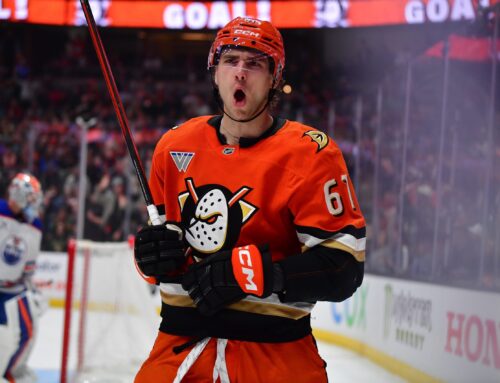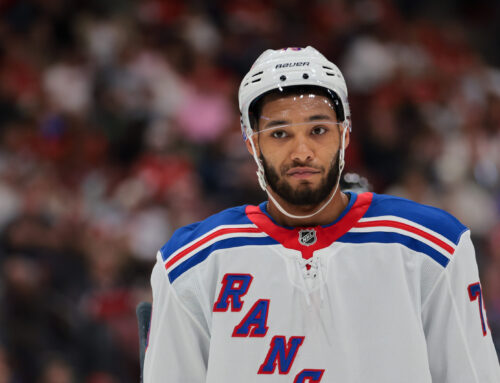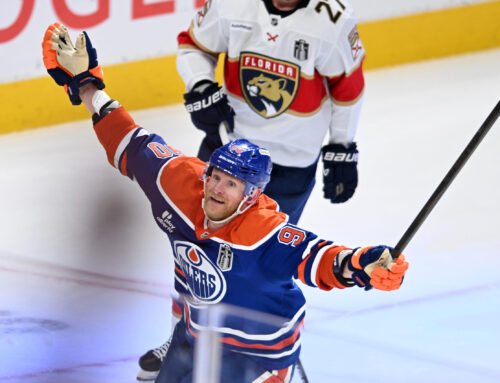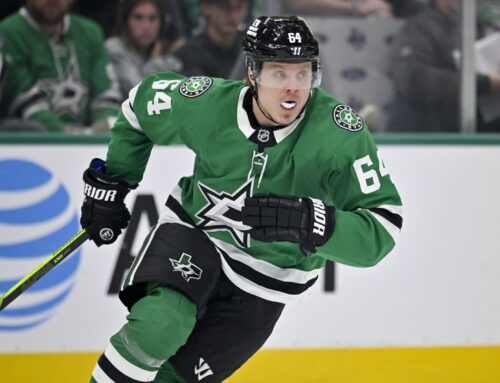
Every postseason, there’s a group of players who exceed expectations, which in turn inflates their value in fantasy hockey.
Last year, for example, a strong playoff performance helped increase the value of players of all skill levels, from Braden Holtby to Tomas Hertl to Lars Eller.
This year is no different. There are plenty of players whose fantasy value is much higher than what it was at the start of the playoffs.
Funnily enough, it doesn’t really work the other way. With a few exceptions (Ryan Dzingel, for example), players don’t see a decrease in fantasy value because of a poor playoff performance. Jake Guentzel getting one point in four games, Johnny Gaudreau getting one point in five games or Nikolaj Ehlers going pointless in six games won’t impact their values at all.
Below are 10 players whose fantasy value is higher now than two months ago. (Note this column was submitted before Game 6 of the Blues-Bruins game on Sunday was finished.)
10. Matt Duchene
Duchene is going to get paid a lot of money this summer, and there are a few reasons why his fantasy value has skyrocketed (and will continue to rise). One is that he’s a free agent, and a new player on a new team always sees a value increase. He also just put up 70 points in the regular season, so there is hope this is the norm for him. Then there’s his 10 points in 10 postseason games, which trailed Artemi Panarin for the team lead by one point.
Truly one of the top surprises of the postseason, Foegele’s play turned a lot of heads. With just 15 points in 77 regular season games, Foegele stepped up with nine points in 15 playoff games. Don’t bet on too much of an uptick in Foegele’s regular season production next year. He’s never been much of a point producer, and the Canes are loaded with young talent that will get chances at a top-six role long before Foegele ever will.
Slavin has always been a steady, if unsexy, fantasy producer. He has played every game in the past three years, and will consistently get you between 30-35 points. In the playoffs, however, he had 11 points in 15 games, second on the Hurricanes. All signs point to this not continuing next year, so let your fellow fantasy general managers be the one to reach for him.
After an excellent half-season that saved the Blues year (the team had the worst record in the league at the start of January), there were still lots of doubters going into the playoffs. After all, we’ve heard this song before (remember Andrew Hammond with the Sens a few years back, or even Carter Hutton with the Blues a year ago). Binnington has been excellent in these playoffs, and his value has kept increasing with every postseason win. He’s proving that he will be the team’s number one netminder next season.
After a 56-point season in 2016-17, there were plenty of high hopes for Coyle. However, he quickly came down to earth with 37 points the following campaign. This year was more of the same. Even after a trade to Boston in February, Coyle had just six points in 21 games. Now in the postseason, he has 16 points in 22 games, a 60-point pace over an 82-game season. I’m apt to believe more in his long-term history, but others will go with the recency bias and draft Coyle much higher than they should this fall.
When Zuccarello was dealt to Dallas in late February, many fantasy general managers were excited to see what he could do with his squad. He immediately impressed, but left the game with a broken arm and didn’t return until the final game of the season. In the playoffs, he had 11 points in 13 games, tied for the team lead, while also playing on the top power-play unit. He impressed a lot of people this postseason, and look for him to be a “sleeper” pick in many pools next year.
4. Roope Hintz
After a decent rookie season where he had 22 points in 58 games — while getting 14 minutes a game and on the second power-play unit — Hintz broke through in the postseason in a big way. After finding chemistry with Tyler Seguin and Alexander Radulov in the last quarter of the season (where he had 13 points in 20 games), he continued that hot streak in the playoffs, posting eight points in 13 games. He has the makings of a very important player in multi-cat leagues with his shots, hits and blocked shots, and if he can stay in a top-six role, his value will continue to soar.
There are plenty of fantasy hockey general managers who believe Mark Stone and Pacioretty will be gold together next season, especially after their hot first round of the playoffs. I am not one of those people. After Stone was dealt to Vegas, Pacioretty’s most frequent linemate was Stone, and Pacioretty had four goals and eight points in 16 games. It wasn’t until the playoffs when they played against Martin Jones — a netminder known for giving up a lot of goals — that Pacioretty exploded with 11 points in seven games. Regardless of what happens next year, Pacioretty’s value has definitely increased this postseason.
Schwartz was quickly dropping during the regular season as he posted 11 goals and 36 points in 69 games. That was a far drop from 59 points in 62 games the previous year. However, he’s been a completely different player in the postseason, already besting his goal total with 12 goals. He also has 18 points in 24 games. He’s no longer the buy-low player he was at the start of April.
1. Cale Makar
Makar was already a sought-after prospect, but think of how much his value increased once he suited up in the postseason. For starters, fantasy general managers who had never seen him play before were able to watch him for 10 games. He was also able to contribute right away, with six points in 10 games despite being on the second power-play unit and the second defensive pairing. He’s now on the radar for many poolies, and he’s going to get drafted much higher this fall because of it.





 BUF
BUF NYR
NYR CHI
CHI WSH
WSH CBJ
CBJ S.J
S.J VAN
VAN ANA
ANA
